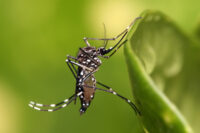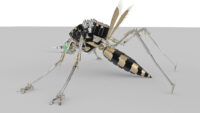About 200,000 genetically modified (GMO) mosquitoes have been released in Djibouti in an attempt to control an invading malaria-transmitting species.
Friendly and reportedly non-biting male Anopheles stephensi mosquitoes that have been produced by Oxitec, a biotechnology firm from the UK, have male mosquitoes with a gene that leads to the death of the female offspring before they become reproductive.
Not all mosquitoes are capable of biting humans and transmitting malaria and other viral diseases, but only the female mosquitoes.

This is the first time the mosquitoes are being released in East Africa and the second time in the continent.
A similar technology has been successfully implemented in countries like Brazil and Cayman Islands, Panama, India as mentioned by the US Centre for Disease Control and Prevention (CDC).
The CDC stated that mosquitoes carrying the gnarled gene have been released around the world after 2019; well over one billion times.
The first lot of mosquitoes was done on Thursday in the small town of Ambouli which is outside Djibouti city.
It is an initial trial in application carried out jointly with genetic engineers Oxitec Ltd, the government of Djibouti and NGO, Association Mutualis.
“We have built good mosquitoes that do not bite, that do not transmit disease. And when we release these friendly mosquitoes, they seek out and mate with wild type female mosquitoes,” Oxitec head, Grey Frandsen, stated.

The man-made mosquitoes contain a gene that impacts the survival rate of female offspring in mated mosquitoes, and hence what is referred to as a “self-limiting gene.”
But only their male progeny live, and the experts from the program predicted that they would also die out in the future.
While the clean-swept male anophelinae colluzi mosquitoes let free in Burkina Faso in 2018 are infertile, the hospitable stephensi mosquitoes can reproduce.
The release is part of the Djibouti Friendly Mosquito Program that was initiated two years ago to prevent the transmittance and survival of Anopheles stephensi which is an invasive species common in the country since 2012.
Malaria has since decreased in the country to near elimination, yet the country recorded nearly 30 malaria cases recently. It occurred precisely since then that malaria incidence increased progressively in the country to reach 73, 000 by the year 2020.
It has since spread to other six African countries of Ethiopia, Somalia, Kenya, Sudan, Nigeria, and Ghana.
Originally from Asia, the Stephensi species is actually extremely challenging to eradicate. It is also known as an urban mosquito because it has adapted to techniques of overall eradication procedures. This pest is active both day and night, and it is known to be highly difficult to kill using the chemical insecticides.
Dr Abdoulilah Ahmed Abdi, a Presidential Health Adviser in Djibouti, mentioned that the government’s objective was to “urgently reverse malaria transmission in Djibouti, which has spiked over the past decade”.
“Not long ago, it [malaria] was extremely rare in our communities,” said Association Mutualis director, Dr Bouh Abdi Khaireh.
“Now we see malaria patients suffer on a daily basis across Djibouti. There is an urgent need for new interventions.”
Organizers said it has been easy to roll out the new anti malaria project due to Djibouti, a small city like country, with slightly over one million people, the majority of whom reside in urban areas.
“Malaria is a serious disease that really affects our health. People are really waiting to see how these friendly mosquitoes will help us win the fight,” said Saada Ismael, a malaria survivor who participated in the community preparation.
Genetically modified organisms have always been a topic of discussion in Africa, and the same way is the scenario with advanced technologies. Different conservation agencies and advocates have cautioned that outcomes shall impact all ecosystems and present food chains.
However, Oxitec’s Mr Frandsen denied liabilities on overall health impacts or environment for more than a decade while their developer of biological solutions launched a billion mosquito modifications.

“Our focus is ensuring that whatever we release in the environment is safe, and highly effective. There is no environmental impact. They are non-toxic, non-allergenic and species specific,” he added.
According to Oxitec, the mosquitoes’ saliva does not contain the genetically modified gene. They also clarified that a person bitten by them would not be exposed to any infections.
“This new solution may be controversial, but it is the future,” Presidential Health Adviser, Dr Abdi, highlighted.
If successful, the next phase of releasing the GM mosquitoes will be in larger numbers and for operational release will be from next year in the country.
A preliminary report indicates that malaria is one of the deadliest diseases that has been known to claim the lives of at least, 600,000 people each year across the world. A recent report by the World Health Organization showed that nine out of ten of all the deaths happen in sub-Saharan Africa.


